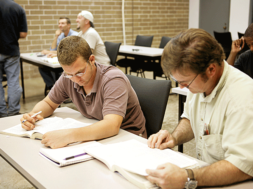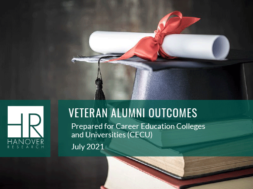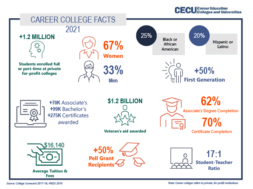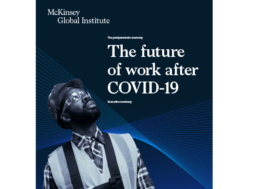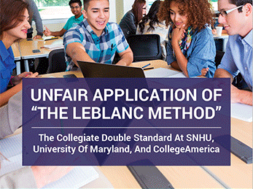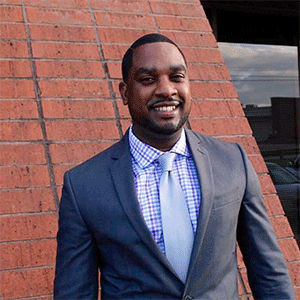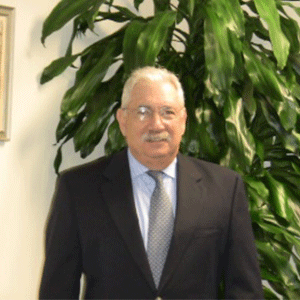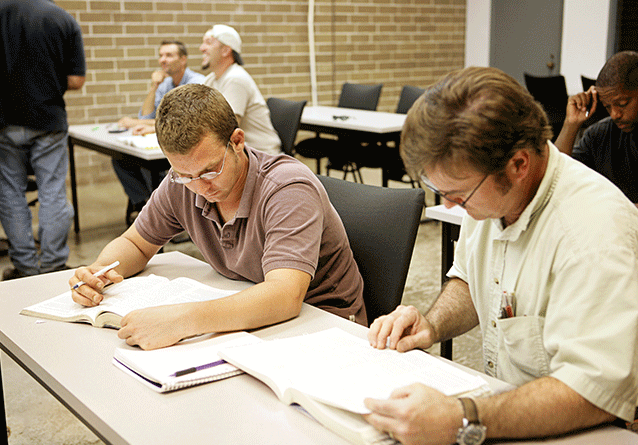
A Phenomenological Exploration of Adult Basic Education Teachers’ Experiences with Professional Development
By Joel Floyd, Ph.D., Chief Executive Director of Adult ESL and Continuing Education, English for a Lifetime Language Institute and Steven Roth, Ed.D., Graduate Professor of Education, Coordinator of the Master’s Programs in Education, Keiser University
Abstract
The role of teacher professional has evidenced that teachers in both K-12 and postsecondary education school sectors require training and development. Without consistent and effective professional development opportunities, teachers are limited in progressing as quality practitioners in the education field and, in turn, student educational outcomes are compromised. Thus, educational leaders have maintained the belief that teachers, despite the educational sector, must obtain adequate training before entering the teaching field. Given the significance of teacher professional development overtime, there has not been an intentional focus of teacher training in every teaching arena. Adult basic education (ABE) teachers’ lack of professional development is alarming given that their primary responsibilities are to instruct nontraditional adult learners in obtaining basic literacy skills to prepare this student population for the workforce. Employing a phenomenological research methodology, this study included five ABE teachers’ lived experiences with professional development. The results indicated that the ABE field lacked a stable and consistent professional development program. Specifically, five prominent themes emerged from the data collected: the autonomous ABE teacher, ineffective ABE teacher professional development, theory and practice, unstructured professional development, and limitations in professional development. Though professional development in the ABE field has remained a conspicuous dilemma, participants were able to overcome the barrier of obtaining sufficient professional development.
Keywords: adult basic education, adult basic education teacher, nontraditional students, phenomenology
Teacher professional development is critical to improving the quality of schools and for student learning (Huber, 2011). Furthermore, professional development equips teachers with opportunities to explore instructional strategies, refine their practice, and expand their professional growth (Komba & Nkumbi, 2008). Professional development may occur in several settings such as teacher-to-teacher dialogue, autonomous research, observations of a colleague’s instructional strategies, and collective in-house training (Mizell, 2010). Building on this understanding of professional development, Zakaria and Daud (2009) posited that professional development is a key factor to determining improved student outcomes.
Accordingly, adult basic education (ABE) teachers play a significant role in instructing nontraditional adult learners who come from diverse or underprivileged populations. Many of these learners lack basic literacy skills critical to their survival and the workforce (Coalition on Adult Basic Education [COABE], 2018). Given the critical role that ABE teachers play in educating the ABE student population, ABE teaches have consistently reported that professional development initiatives in the ABE field are not consistent (C. Smith et al., 2003) and due to lack of funding in these types of adult education programs, professional development opportunities are consistently compromised (SkyLark, 2011). There have been very few studies to explore ABE teachers’ experiences with professional development and the impact of professional development on ABE student outcomes. Therefore, this study was guided by the following research question: How do ABE teachers describe their experiences with professional development?
Review of the literature
Adult education: A brief history
Adult education has played a significant role in the progression of adult learners throughout American history. Though early and conspicuous features of adult education implementation existed at the federal level during the mid-19th century, the literature indicates that the federal government has addressed views on adult education for over 230 years (Deighton, 1971). Religious instruction, vocational courses, and common schools of the original colonies were the foundations of early federal government involvement in adult literacy education during the Revolutionary War (Sticht, 2007). In the genesis of American history, the government provided funds to assist and encourage adults in eradicating educational deficiencies that negatively challenged their productivity as well as contribution to the progression of the nation (U.S. Department of Education, 2013).
Federal legislation and adult education
Several pieces of legislation have bolstered adult education at the federal level until present day. The Economic Opportunity Act of 1964 was signed into legislation by President Lyndon B. Johnson. The Act provided federal laws and funding for ABE, which Johnson envisioned in his war against poverty and his efforts to create a Great Society, increasing the federal government’s role in education and health care (Sticht, 2007). The emergence of the Adult Education Act of 1966 followed the Opportunity Act, and the Adult Education Act was moved from the poverty programs to an official education program of the U.S. Department of Education (Rose, 1991). Two major provisions of the Adult Education Act were the professionalizing and expanding of adult education and assisting native and foreign-born adults in acquiring the knowledge they needed to progress in their lives (Rose, 1991).
Adult education in modern America
Federal legislation has continued to create rapid plans of action that would produce a functionally literate population of adults. Four amendments after the Adult Education Act of 1966 have been credited for maintaining adult education in the United States:
- The age for participating in an adult program was lowered from age 18 to 16.
- Educational services were extended to individuals with less than a decade of education, immigrants who spoke English as a second language (ESL), and those who wanted citizenship classes.
- Services were provided to adults who lacked basic skills which disabled them from functioning well in society.
- Services were provided to allow partnerships with businesses, labor unions, and educators to provide literacy course offerings for adult employees with limited basic skills (Rose, 1991).
ABE learner characteristics
Understanding the distinct nature of ABE learners is critical to the types of ABE instructional methods employed when instructing adult learners. In a study on ABE program models, ABE learners were categorized as nontraditional students (Zaft et al., 2006) possessing the following characteristics:
- Does not have a high school degree, nor attend college after obtaining one or GED;
- Works at a full-time job while enrolled in adult education classes, or
- A single parent (Choy, 2002).
ABE learners have been further categorized as a population of learners who vary widely among races and socioeconomic levels; coming from distinct religious, cultural, and linguistic backgrounds; possessing little or no formal education, and coming from an abundance of learning experiences, which can become learning resources. In the same context, ABE learners have exceptional background experiences, which firmly distinguishes them from the traditional adult learner (Cronen et al., n.d.).
ABE learner barriers
There are numerous barriers for ABE learners in becoming academically successful. There are factors such as low self-efficacy, financial issues, insufficient guidance, lack of academic preparation, and inadequate family support (McGivney, 2004). Social barriers, discrimination, and bias have also been factors which play a substantial role in the failure to achieve proficiency in the language and other academic studies (Zacharakis et al., 2011). Additional barriers such as undiagnosed learning disabilities greatly impede any real academic progress (Bowman & Plourde, 2012).
Modern adult basic education in the states
What is the actual status of modern ABE in the United States? According to the State of Iowa Department of Education (2015), the following are the goals for ABE learners:
- Gain employment or better their current employment,
- Obtain a high school equivalency diploma by passing the state selected assessment,
- Exit public welfare and become self-sufficient,
- Learn to speak, read, and write in the English language,
- Master basic academic skills to help their children succeed in school,
- Become U.S. citizens and participate in a democratic society,
- Gain self-esteem, personal confidence, and a sense of personal and civic responsibility. (p. 5)
Theoretical framework
The theories of Guskey (2002), Bandura (1994), and Knowles (1994) were the basis for the theoretical framework of this study. Guskey’s model of teacher change is based on three practical themes: professional development, classroom practices, and change in the teacher’s attitudes and beliefs. Bandura’s theory of self-efficacy suggests that an individual’s beliefs regarding their own abilities lead them to enhance their level of performance and abilities that have an impact and affect their lives. Knowles’ theory on adult learning, known as andragogy, includes the study of everything regarding learning and teaching which brings adult learners to their full degree of humanness.
Professional development and the background of ABE teachers
Professional development has been defined as a gradual change process in which instructors acquire a body of knowledge and skills to improve the quality of teaching for learners and, ultimately, to enhance learner outcomes (Kutner et al., 1997). However, many ABE teachers receive little, if any, professional development in the field (C. Smith & Gillespie, 2007). Rather, teacher professional development has been immensely prioritized in the K–12 educational arena, despite previous federal legislation that mandated ABE staff training across the states (Comings et al., 2006). Further, most ABE teachers have only acquired teacher certification in elementary and secondary education (D’Amico, 1995; Mackin et al., 1996; Sabatini et al., 2000). Very few of these teachers enter the field having graduated from an academic program designed to prepare teachers for the ABE classroom (Mackin et al.,1996) and ABE has been one of the few fields that allow individuals to enter the classroom with very little training (Comings et al., 2006).
Method
A qualitative phenomenological approach was employed for this study. This allowed us to provide rich, thick, and textured descriptions of the participants’ lived experiences with the phenomenon of professional development under exploration. Table 1 outlines participant demographic data. To maintain participant confidentiality, participants’ names were coded with the letter P and assigned a number from 1 through 5.
| Table 1: Participant Demographic Information | ||||
| Code name | Gender | Level of education | Years as ABE teacher | |
| P1 | Female | Master’s degree | >28 years | |
| P2 | Female | Master’s degree | 8 | |
| P3 | Male | Master’s degree | 7 | |
| P4 | Female | Master’s degree | 28 | |
| P5 | Male | Master’s degree | 5 | |
Note. N = 5.
Participant selection
We selected five participants from an adult education literacy program located in downtown Atlanta, Georgia. To participate in this study, participants had to be an active ABE teacher in the literacy action program; had experienced two or more professional development trainings, formal or informal; and be willing to participate in the study.
Data analysis
After the participants’ interviews were transcribed, accuracy was ensured. We used a member checking document, providing each participant with a copy of the transcripts. This allowed participants to revisit or contextualize any of their statements. During the analysis of the transcripts, we implemented the interpretive phenomenological analysis (IPA) approach by Smith and Osborn (2008). We wrote reflective notes and conducted a comparative analysis between our notes and the participants’ responses. From this study, five salient themes were developed which encompassed the participants’ lived experiences with professional development.
Results
The results of this study reveal the significance of professional development in the ABE field. Tables 2 and 3 represent the initial and recurring (core) themes from the data collected.
| Table 2: Frequency of Initial Themes Emergent from Phase 1 of Data Analysis | ||||
| Code | Frequency of themes | |||
| Insufficient ABE teacher training | 12 | |||
| Independent researcher | 14 | |||
| Post PD transformations | 3 | |||
| Second career options | 3 | |||
| Ambiguous job placement | 4 | |||
| Grant driven–directed | 5 | |||
| Increase PD funding | 3 | |||
| Limited PD resources | 18 | |||
| Progressive PD | 5 | |||
| ABE instructor needs | 2 | |||
| COABE & TCSG | 7 | |||
| In-house–collaborative PD | 4 | |||
| Ineffective–unstructured PD | 25 | |||
| For-profit vs. non-profit | 1 | |||
Note. PD = professional development; COABE = Coalition of Adult Basic Education Association; TCSG = Technical College System of Georgia.
| Table 3: Core Theme Selection and Brief Description(s) | ||||
| Core themes | Description | |||
| ABE as independent researcher | ABE teachers described having the necessity to train themselves. | |||
| Ineffective & unstructured professional development | ABE teacher challenges with professional development were discussed. | |||
| Insufficient ABE teacher pretraining | ABE teachers entered the field with little to no experience in teaching the ABE student population. | |||
| Theory vs. practice | ABE teachers described imperatives of practical training in professional development. | |||
| Limitations in professional development | The paucity of ABE training, resources and access versus K–12 PD resources. | |||
Note. PD = professional development.
Theme 1: The autonomous ABE teacher
P4: “No one knew what to do even the administration, so I had to do a whole lot of research on my own.”
P2: “I discovered professional development through my own research versus what the director attempted to tell me.”
Participants’ experiences with professional development were described as an independent task. Participants usually had to collect their own resources to assist them with instructional tasks. Despite the challenges of having to obtain independent resources, participants expressed deep feelings of satisfaction when they were able to answer their own questions about teaching and learning.
Theme 2: Ineffective teacher professional development
P3: “PD is normally overwhelming. The flood of information is like trying to drink from a firehouse as opposed to a water fountain.”
P5: “Professional development is not realistic. It is missing the in-house component. We know what our students need.”
Participants described their encounters with professional development as a frustrating activity. Participants needed resources to assist them in maximizing their instructional strategies and improving student outcomes.
Theme 3: Theory and practice
P1: “We received a lot of theory, but we are not able to apply it.”
P3: “We have had in-house training that I found to be effective. We learned about the 20/60/20 teaching approach, and it helped me.”
P4: “Individuals who oversee adult literacy programs need to understand that we need more than theory. We need practice.”
Participants, both individually and collectively, expressed a great frustration with the overabundance of theory and their inability to transfer theory into practice.
Theme 4: Unstructured professional development
P2: “PD sessions I’ve attended are usually overbooked, and the presenter information is usually not available.”
P3: “I’ve just been frustrated with the buffet of choices, the uninteresting materials, and the lack of relevancy to my instructional objectives.”
Participants described, in many cases, that professional development training was not relevant to their jobs, and felt that professional development initiatives in the ABE field lacked structure and could not be taken seriously.
Theme 5: Limitations in teacher professional development
P1: “PD tends to trend. Whatever [Washington] feels like we need, they send it to the states, and the states send it out to the organizations they are supporting. It’s based on what they want.”
P5: “When I was working towards my master’s in adult education, I noticed that it was a challenge trying to find PD in adult education. I discovered that most PD was centered in K-12 education.”
In general, participants described their professional development activities as limited in scope. Moreover, participants maintained that the constraints on their professional development experiences could limit their instructional capacity and, in turn, student outcomes could be compromised.
Results summary
The results from the collected data comprised five core themes critical to this study’s overall purpose and guiding research question. Each theme addressed the lived experiences of the ABE teacher participants’ varied experiences with professional development. Figure 1 is a depiction of core themes in connection to the data collected.
Figure 1: Core Themes Emergent from Phenomenological Data Sources
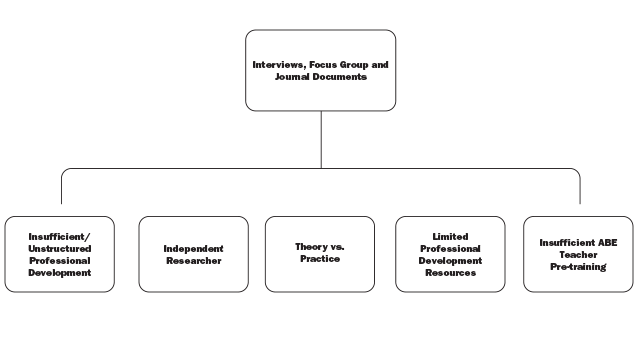
Conclusion
The purpose of this study was to investigate ABE teachers’ lived experiences with professional development. Results indicated that obtaining adequate professional development continues to be an issue among the ABE teacher population, which over time could impact adult student learning outcomes. Furthermore, the results of this study aligned with the dearth of previous research that has addressed issues with professional development in the ABE field. This study’s findings support a report from the National Research Council (2012) that professional development in the ABE field is conspicuously fragmented.
From this critical literature, we agree that the ABE field has gone without a serious treatment of establishing a cohesive professional development teacher training plan. While we were able to collect insightful data concerning the phenomenon of professional development, the study was not without limitations. First and foremost, the study involved a significantly small sample (N = 5) of participants. Therefore, the data collected and analyzed cannot represent all ABE teachers’ lived experiences with professional development. However, a smaller sample allowed us to gain a deeper insight of participants’ experiences with professional development that would not have occurred using a quantitative approach. An additional limitation is couched in the multiplicity of interpretations that could emerge because of this study.
Overall, the results of this study suggest that participants understood the value of effective professional development opportunities while, at the same time, possessing deep frustration due to the instability of professional development in the field. We came to an interpretive understanding, however, that participants’ sense of self-efficacy and passion for education were drivers of their ability to persist in their teaching obligations without a stable professional development program. Ultimately, this study has provided a deeper insight on current ABE teachers’ experiences with professional development, which can serve as another critical point of discussion, during the next wave of educational reform.
References
Bandura, A. (1994). Self-efficacy. In V. S. Ramachaudran (Ed.), Encyclopedia of human behavior (Vol. 4, pp. 71–81). Academic Press. (Reprinted from Encyclopedia of mental health, pp. 71-81 by H. Friedman, Ed., 1998, Academic Press)
Bowman, S. L., & Plourde, L. A. (2012). Andragogy for teen and young adult learners with intellectual disabilities: Learning, independence, and best practices. Education, 132(4), 789–798. http://www.projectinnovation.biz/education.html
Choy, S. P. (2002). Nontraditional students: Findings from the Condition of Education 2002. U.S. Department of Education, National Center for Education Statistics.
Coalition on Adult Basic Education (COABE). (2018). Adult education is needed now. https://www.coabe.org/adult-education-is-needed-now/
Comings, J., Garner, B., & Smith, C. (Eds.). (2006). Review of adult learning and literacy, Volume 6. Connecting research policy, and practice: A project of the National Center for the Study of Adult Learning and Literacy (1st ed.). https://doi.org/10.4324/9781410617330
Cronen, S., Yin, M., & Crondello, L. (n.d.). Teachers of adult education and the students they serve. A snapshot from three states. https://www.air.org/sites/default/files/downloads/report/1Teachers-of-Adult-Education-Three-States-Sept-2015_0.pdf
D’Amico, D. (1995, October). Staffing patterns in New York City Adult Literacy Initiative programs: Data and directions. Literacy Assistance Center.
Deighton, L. C. (Ed.). (1971). Federal education activities. In Encyclopedia of education (Vol 1, 1–92). Gale Group.
Guskey, T. R. (2002). Professional development and teacher change. Teachers and Training: Theory and Practice, 8(3/4), 381–390.
Huber, S. G. (2011). The impact of professional development: A theoretical model for empirical research, evaluation, planning and conducting training and development programmes. Professional Development in Education, 37(5), 837–853.
Kline, M. (1998, February). Akron Perkins normal schools: An institutional history [Paper presentation]. History of Education Society Annual Meeting, Chicago, IL, United States.
Knowles, M. (1994). The adult learner: A neglected species (3rd ed.). Gulf Publishing.
Komba, W. L., & Nkumbi, E. (2008). Teacher professional development in Tanzania: Perceptions and practices. Journal of International Cooperation in Education, 11(33), 67–83. http://birbhum.gov.in/DPSC/reference/39.pdf
Kutner, M., Sherman, R., Tibbetts, J., & Condelli, L. (1997). Evaluating professional development: A framework for adult education. https://calproonline.org/pubs/evalmon.pdf
Mackin, K., Dwyer, M. C., Godin, K., Schenck, A., & Seager, A. (1996). National evaluation of the Section 353 set-aside for teacher training and innovation in adult education. RMC Research Corporation.
McGivney, V. (2004). Understanding persistence in adult learning, open learning. The Journal of Open, Distance and e-Learning, 19(1), 33–46. https://doi.org/10.1080/0268051042000177836
Mizell, H. (2010). Why professional development matters. https://learningforward.org/wp-content/uploads/2017/08/professional-development-matters.pdf
Rose, A. D. (1991). Ends or means: An overview of the history of the Adult Education Act. ERIC Clearinghouse on Adult, Career, and Vocational Education (No. ED 341 875).
Sabatini, J. P., Daniels, M., Ginsburg, L., Limeul, K., Russell, M., &Stites, R. (2000). Teacher perspectives on the adult education profession: National survey findings about an emerging profession (Tech. Rep. No. 00-02). National Center on Adult Literacy.
SkyLark, T. (2011). Funding barriers for adult education programs. Academic Leadership Journal, 9(3), 1–5.
Smith, C., & Gillespie, M. (2007). Research on professional development and teacher change: Implications for adult basic education. In J. Comings, B. Garner, & C. Smith (Eds.), Review of adult learning and literacy: Connecting research, policy, and practice (pp. 205–244). Lawrence Erlbaum Associates. http://www.ncsall.net/fileadmin/resources/ann_rev/smith-gillespie-07.pdf
Smith, C., Hofer, J., Gillespie, M., Solomon, M., & Rowe, K. (2003). How teachers change: A study of professional development in adult education (NCSALL Reports No. 25a). National Center for the Study of Adult Learning and Literacy. http://www.ncsall.net/fileadmin/resources/research/report25a.pdf
Smith, J. A. (2008). Qualitative psychology: A practical guide to research methods. Sage.
Smith, J. A., & Osborn, M. (2008) Interpretative phenomenological analysis. In J. A. Smith (Ed.), Qualitative psychology: A practical guide to research methods (pp. 53–80). Sage.
State of Iowa Department of Education. (2015). Adult education and literacy: Program year 2015 annual report. https://files.eric.ed.gov/fulltext/ED572242.pdf
U.S. Department of Education. (2013). An American heritage: Federal adult education: A legislative history 1964-2013. https://lincs.ed.gov/publications/pdf/Adult_Ed_History_Report.pdf
Zacharakis, J., Steichen, M., Diaz de Sabates, G., & Glass, D. (2011). Understanding the experiences of adult learners: Content analysis of focus group data. Adult Basic Education and Literacy Journal, 5(2), 84–95. http://www.coabe.org/html/abeljournal.htm
Zaft, C., Kallenbach., & Spohn, J. (2006). Adult basic education programs and models. http://www.ncsall.net/fileadmin/resources/research/op_collegetransitions
Zakaria, E., & Daud, M. Y. (2009). Assessing mathematics teachers’ professional development needs. European Journal of Social Sciences, 8(2), 225–231.
JOEL FLOYD, Ph.D., is the Chief Executive Director of Adult ESL and Continuing Education at English for a Lifetime Language Institute in the Metro Atlanta, Georgia area. Before his tenure at English for a Lifetime, Dr. Floyd served in several teaching and leadership roles in both K-12 and postsecondary adult education school settings. Dr. Floyd is passionate about helping adult learners reach their career goals, and he has led several teacher professional development seminars, helping teachers of adult learners to refine and to expand their pedagogical techniques in the classroom. Recently, Dr. Floyd was awarded the Lindy Lopez Butner Memorial Grant, which has enabled his English language program to provide resources for training adult immigrants for America’s workforce. Additionally, the ACM Publication of e-learn magazine online has recently released, Dr. Floyd’s latest education article titled, A Challenging Reality: Transitioning from the classroom to e-learning among English language learners.
Dr. Floyd holds a Bachelor of Arts degree in English from Florida Agricultural and Mechanical University, a Master of Theological Studies from Emory University, and his doctoral degree from Keiser University. Dr. Floyd’s research interests include teacher professional development in the adult basic education (ABE) field, critical pedagogy and equity among English language learners in postsecondary institutions, and student recruitment and retention among non-traditional adult learners. Furthermore, Dr. Floyd is a member of the Georgia Teachers of English to Speakers of Other Languages (GATESOL) the American Association for Adult and Continuing Education (AAACE), and is a member on Keiser’s University’s advisory board in the graduate school of education.
Contact Information: Joel Floyd, Ph.D. // Chief Executive Director of Adult ESL and Continuing Education
English for a Lifetime Language Institute // 678-694-8344 // www.englifeglobal.org // https://www.linkedin.com/in/joel-floyd-ph-d-35684744/
STEVEN ROTH, Ed.D., is a professional educator with more than 30 years of experience in public, private and international education. He has held leadership roles as a K-12 teacher and principal, college professor, career college director, executive director of postsecondary programs for students with special needs and director of studies in a public high school in Wuxi, China (PRC). He also served as director of college counseling/placement organizations and language schools director in Latin America for numerous years. Currently, Dr. Roth is a graduate professor at Keiser University in Ft. Lauderdale, Florida. He holds a Bachelor of Arts degree in history from Brooklyn College, a Master of Arts degree in Latin American studies from New York University, a Master of Science degree in Special Education from Grand Canyon University as well as a Doctor of Education degree in Educational Leadership from Nova Southeastern University. His most recent presentations have focused on multicultural education, methods to increase academic achievement, teacher professional development, and retention in online classes.
Contact Information: Steven Roth, Ed.D. // Graduate Professor of Education, Coordinator of the Master’s Programs in Education // Keiser University // 754-422-8998 // sroth@keiseruniversity.edu // www.keiseruniversity.edu // Social Media: Linkedin
